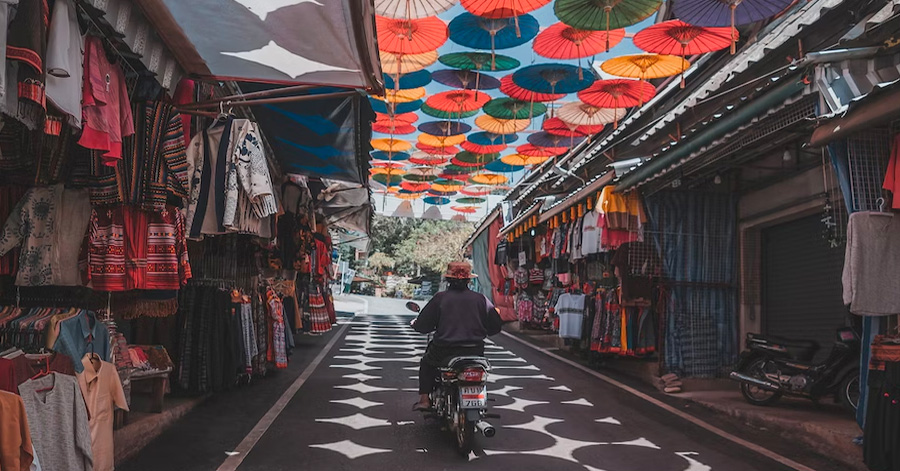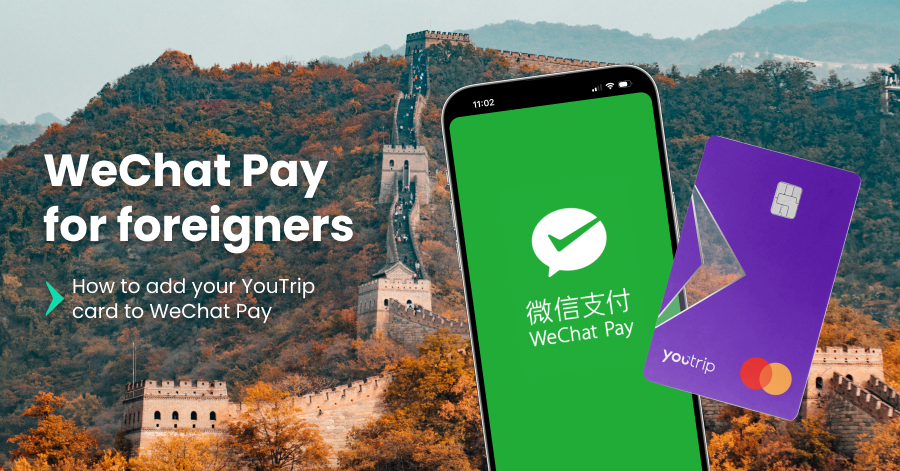Tourist traps are some of the most frustrating experiences to navigate around. Not forgetting to mention that the lack of proper law enforcement in certain aspects often allow scammers to go unscathed… But fret not, we’re here to help! Here are some tips and tricks for spotting tourist traps in Southeast Asia.
Have you ever fallen prey to a nasty tourist trap while on your travels overseas? Well, it’s okay, we’ve all been there before (sadly). One shouldn’t need to worry when they’re abroad for leisure, so we’re here to list out eight common tourist traps in Southeast Asia so you’ll be in the know to better avoid being cheated on your next adventure.
💜 Stay Up To Date:
– Solo Travelling In 2023: Must-See Destinations For The Independent Adventurer
– How To Capitalise On The South Korean Won Right Now
– Travelling With Kids In 2023: How To Make It Memorable And Stress-Free
1. Taxi Trouble (Most Prominent In The Philippines & Thailand)
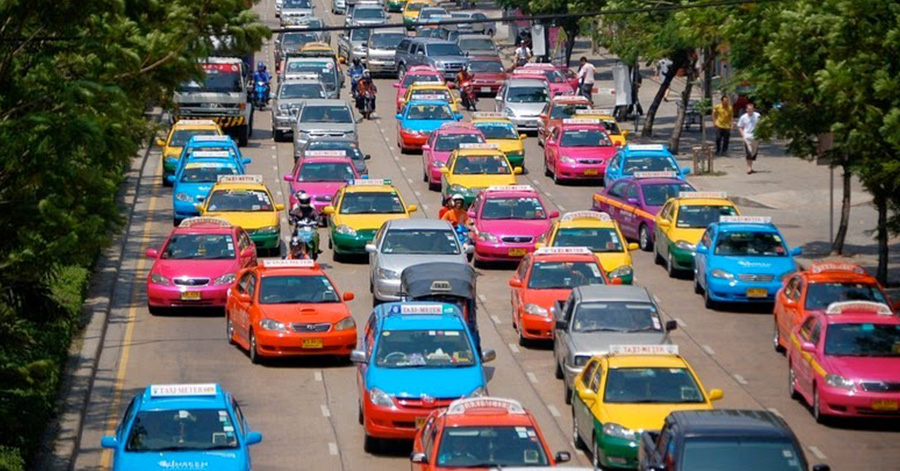
Image credits: Amusing Planet
Picture this: You finally land at your destination after a tiring flight and all you want to do is get to your hotel and unpack so you can finally begin your trip. You get into a taxi and the taxi driver starts driving you to your desired location. After a good five to ten minutes, you realise you don’t know how much your ride has incurred and the taxi meter isn’t turned on! You point this out to the taxi driver, and he exclaims that he forgot to turn it on (usually with superb acting), before suggesting that you pay a fixed amount that you both agree on.
This is a common method used by taxi drivers in Thailand, the Philippines, and almost every other Southeast Asian country, to scam some extra money off tourists who don’t know the rate of local taxi fares. Falling prey to this scam and others like it is fairly common and usually not as damaging to the wallet as compared to some of the other scams on this list, but nonetheless leaves a sour feeling once you’ve realised you’ve been cheated.
Thankfully it’s easy to prevent such a situation from happening by staying vigilant and refusing to get into any taxi where the driver refuses to use the meter.
Tourist Traps In Southeast Asia You Should Avoid: Check out our guide on 10 tips to save money in Thailand
2. Bump & Drop Tactics (Philippines)
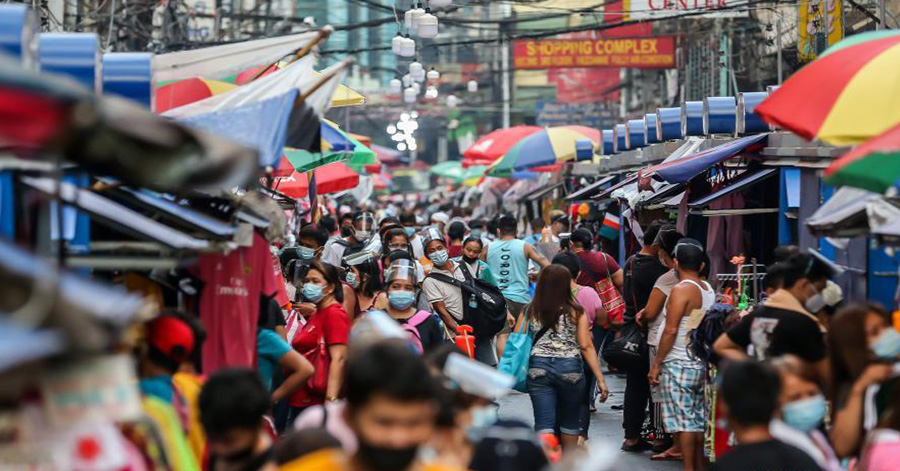
Image credits: XINHUANET
Bumping into a stranger on a crowded street is inevitable. However, be wary of this when you’re travelling in the Philippines, especially Manila because a simple bump won’t only allow for pickpocketing to occur right under your nose but also this — introducing the “Bump & Drop” tactic.
This scam involves the scammer lightly bumping into your shoulder on a busy street and proceeding to drop whatever’s in their hands. This might range from low-value items like food, all the way up to mobile phones that have been prepared beforehand with existing damages. The scammer will then demand compensation to cover the costs of repairing the damaged item. Being a foreigner not looking to attract attention needlessly, you might just eventually give in and pay the demanded sum of money.
Avoiding this scam is relatively difficult because it happens so randomly and unexpectedly that it gives you little time to react. And if you’re not somebody to just walk away when encountering such a situation, then paying a negotiated amount might just be inevitable.
Tourist Traps In Southeast Asia You Should Avoid: Check out our guide to solo backpacking in the Philippines for 10 days
3. Tuk-Tuk Tours You Didn’t Ask For (Thailand)
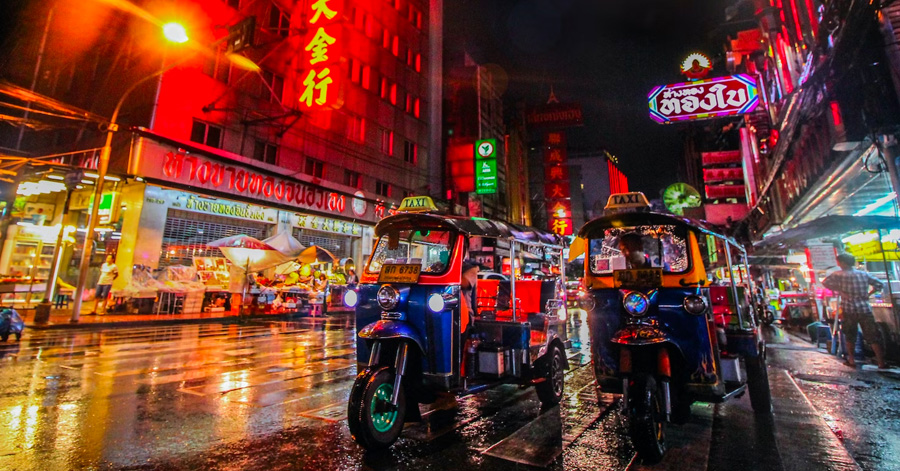
Image credits: Unsplash
If you’ve ever been to Thailand, you’ll definitely be familiar with this novel transportation method. Whether you’ve previously experienced a Tuk-Tuk ride without incident or have never been on one before, this entry is here to prevent you from being scammed if you’re planning to hitch a ride onboard one of these speciality vehicles.
Tuk-Tuk scams are commonplace in Thailand, consisting of excessively hiked-up prices and forcing a group of tourists to hire more than one Tuk-Tuk, citing a lack of sitting space to accommodate the whole group. But none are more frustrating than the unfortunate rides that make huge detours to somewhere that the driver says is “on the way” but takes you in the opposite direction to a tailor shop or farming complex that the driver is affiliated with. This detour not only wastes your precious time but the place that’s supposedly “on the way” will usually try to peddle you overpriced products that the driver takes a cut from.
If you ever find yourself in this situation, you can always pay the driver a small amount to compensate for the short distance you’ve already travelled and get off the Tuk-Tuk to find other means of transport.
Tourist Traps In Southeast Asia You Should Avoid: Check out our guide on affordable Thailand accommodations from S$21/night
4. Wrong Change/Note Scams (Most Prominent In Thailand & Vietnam)
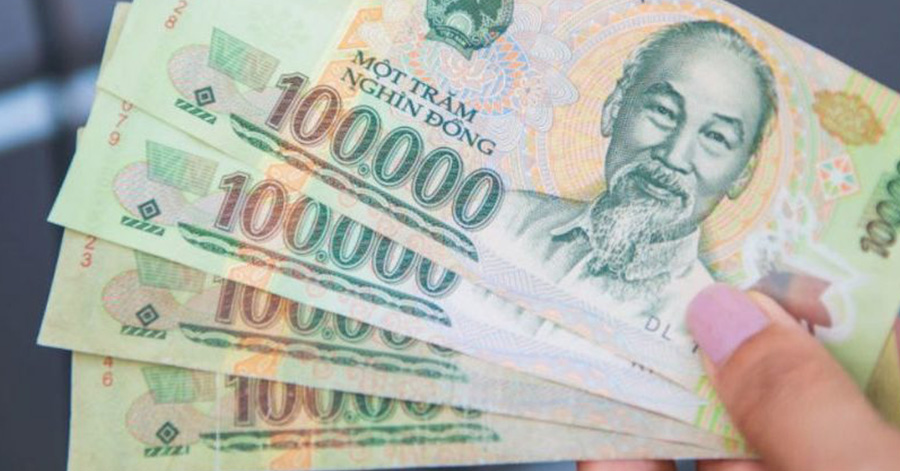
Image credits: MOVETOASIA
A simple scam that can happen literally almost everywhere, the wrong change or wrong note scam takes advantage of the fact that tourists are usually not yet familiar with the destination’s currency and denominations, making it easy to short-change a customer during transactions. This is more common in countries like Thailand and Vietnam where the currencies have a lot of zeros.
This tourist trap is usually carried out by the cashier who swaps out the note paid with a similar looking one with a lower denomination, before alerting the customer that they need to hand over more cash. Though this scam is less likely to happen in proper brick-and-mortar stores that typically have security cameras behind the counter, one can never be too safe as such instances might still happen regardless.
To prevent becoming a victim of this, familiarise yourself with the local currency as quickly as possible and make it a point to distinctly show the cashier that you’re passing over the intended amount. Or by asking the vendor if he/she has change for a certain denomination, showing that you’re aware of how much you’re handing over. Alternatively, you may opt to use cashless forms of payment to not only speed up the process but prevent any handling of physical cash. Peep: your YouTrip card! Spend with the best rates in town, zero fees, and say goodbye to the days of sitting hunched over a pile of petty cash.
Tourist Traps In Southeast Asia You Should Avoid: Check out our guide on what to eat in Vietnam
5. Self-Proclaimed Tour Guides (Thailand)
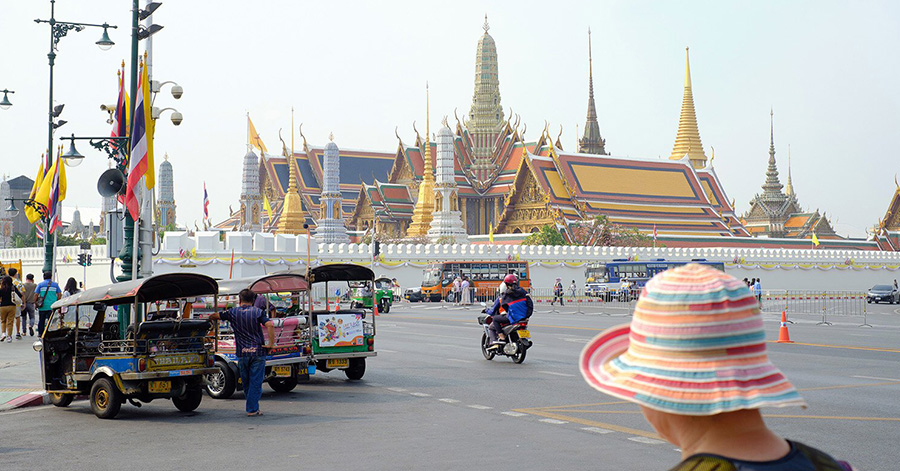
Image credits: 5050 Travelog
Also known as the “This Place Is Closed” scam, these sketchy “tour guides” are often encountered outside major tourist attractions in Thailand. They’ll then fool unsuspecting tourists into hopping onto their comprehensive tours by telling them that the attraction they’re planning on visiting is closed at that time. Psst, spoiler alert, they’re not actually closed. Tourists are then pushed to visit an alternative attraction by hopping into their vehicles.
In actuality, this is all a ploy to bring tourists to out-of-the-way shops that they’re in cahoots with so the shop owners can peddle overpriced goods which they receive a commission from, in addition to the amount you’re already paying for the “tour”.
When approached by these “tour guides” politely decline no matter how persistent they are, and be on your merry way — especially if you already have your whole day planned out. Doing your research and searching online for opening hours before visiting an attraction will certainly be a big help and always head to the official ticket sales desk for any attraction when in doubt.
Tourist Traps In Southeast Asia You Should Avoid: Check out our guide on major Thailand festivals you have to experience
6. Help My Hungry Baby (Cambodia, Laos & Vietnam)
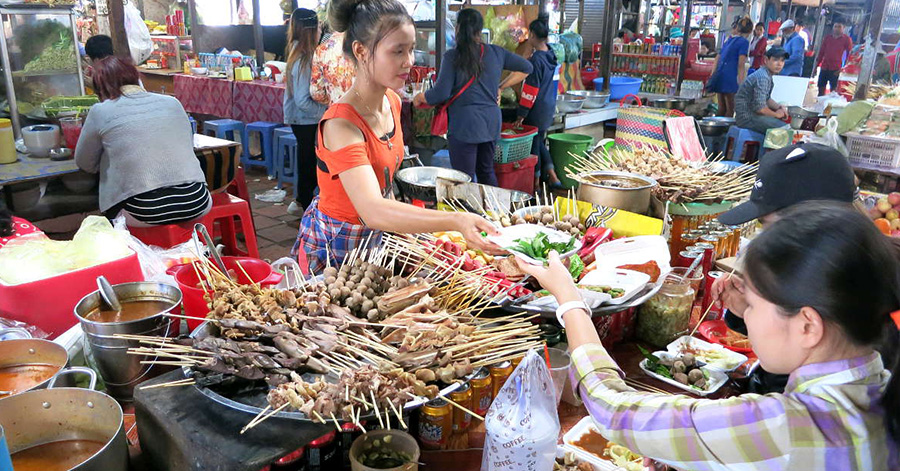
Image credits: Authentic Food Quest
Dubbed the Baby Milk scam, victims have reported falling prey to this ploy mainly in Cambodia. But in recent years, it’s been happening more often in Laos and Vietnam too. The scam usually plays out with a distraught woman carrying a drowsy-looking baby, approaching tourists at popular attractions and dining areas stating that she can’t afford formula milk for her baby and requesting would-be targets to purchase the milk powder from specific shops nearby. Formula milk often costs an exorbitant amount of money, and the woman gets a cut of the amount paid when she returns the product to the same shop. Alternatively, instead of a woman carrying a baby, you may be approached by a child claiming that their younger sibling is starving and needs formula milk urgently.
When encountering such a situation, you should refuse to do as requested and not entertain these scammers. Though it may be heart-wrenching to turn a child or woman with a baby away, giving in to this scam supports the use of child beggars to gain sympathy in return for little earnings for the unfortunate themselves.
Tourist Traps In Southeast Asia You Should Avoid: Click here for how many months in advance you should be booking your flights
7. Motorcycle & Jet Ski Maintenance (Philippines, Thailand & Vietnam)
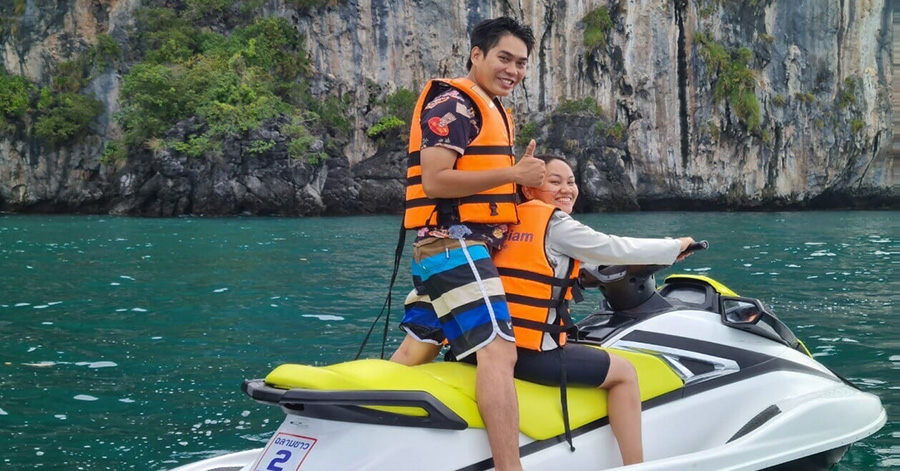
Image Credits: QBIC Travel
Having roads that suffer from heavy traffic congestion, rental motorcycles have been a popular mode of transportation for tourists when they visit Southeast Asian countries like Philippines, Thailand, and Vietnam. Similarly, the usage of rental jet skis as an activity is a favourite of many travellers whenever they visit the coastal areas of Pattaya, Phuket, and Danang. If renting a motorcycle or jet ski while on your trip to these three countries are your cup of tea, beware that some travellers have reported a scam in which rental companies dishonestly charge tourists additional fees for maintenance, citing damages to the vehicles.
When put in such a situation without being aware of these scams beforehand, paying the inflated charges that the rental companies slap onto rentals is usually unavoidable due to potential legal actions that the company might take against you. Therefore, it’s important that you take photos of any existing dents and scratches on the vehicle at the time of rental to prevent the company from claiming that you’ve damaged their vehicle.
Tourist Traps In Southeast Asia You Should Avoid: Check out our 5D4N Bali itinerary
8. A Familiar Face (Philippines)
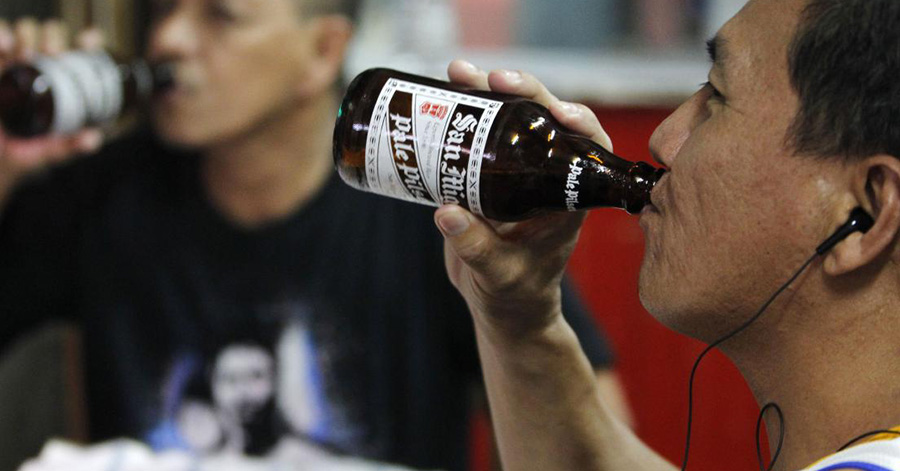
Image Credits: Think Global Health
The last scam on our list is one that’s done fairly easily and can be prevalent in almost any country. However, in recent years, reports of such scams have come from the Philippines — particularly Manila. The scam involves a friendly stranger that’ll approach you claiming that he either works at or is staying in the same hotel that you are. This “friendly” stranger then makes you let your guard down by striking up a conversation and offering to show you around since you’re a tourist. If you accept his offer, you may be robbed, have your drink spiked, or even get cheated of your money through sob stories used to gain sympathy.
When dealing with such situations, the simplest way to deal with these scammers is to just ignore them as it’s important to note that over-friendly strangers might often be too good to be true.
Tourist Traps In Southeast Asia You Should Avoid: Check out this guide on affordable Bali resorts from S$53/night
Always Stay Vigilant!
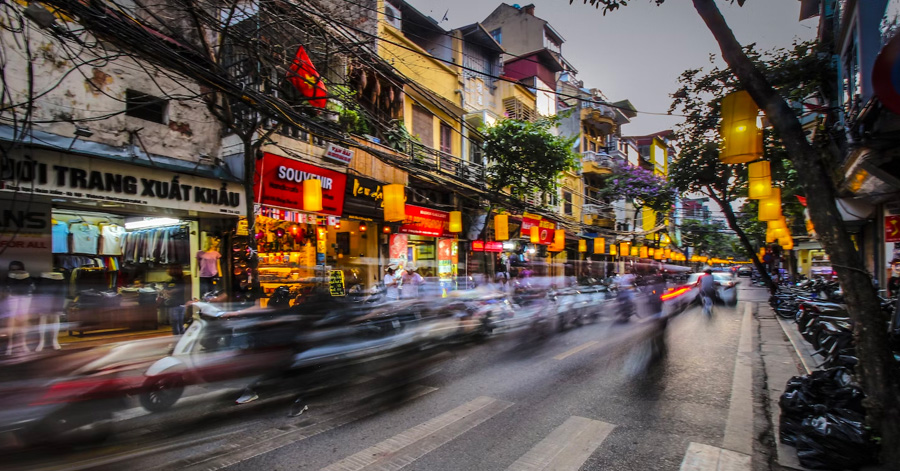
It’s safe to say that things might not always go according to plan when travelling, but we should always stay vigilant. Better safe than sorry! And as usual, while booking those plane tickets and planning those fun-filled activities in the sun, don’t forget to make use of your YouTrip Card to lock in those wholesale exchange rates and skip those pesky bank fees!
As Singapore’s favourite multi-currency wallet, we aim to get those pesky fees out of the way and help you save on your travels. With the best foreign exchange rates, no longer will you have to deal with those long queues at money changers! So if you’re looking for a go-to travel card, sign up for your complimentary YouTrip card today with promo code <YTBLOG5> and get FREE S$5 in your account! Then, head over to our YouTrip Perks page for exclusive offers and promotions — we promise you won’t regret. For more great tips and articles like this, join our Telegram (@YouTripSG) and subscribe to our free weekly newsletter here or down below.
And while you’re at it, why not join the conversation with thousands of #YouTroopers in our very own Community Telegram Group @YouTripSquad? Get tips and tricks to everything YouTrip including exclusive invites to exciting events and experiences, & be part of the #YouTripSquad! 💜
Safe Travels!
Related Articles
Epic Travel Disasters: How To Avoid The Chaos
Here’s How I Experienced Nyepi — Bali’s Day Of Silence
Break-Up Horror Stories From Your Community That’ll Make You Feel Glad You’re Single




